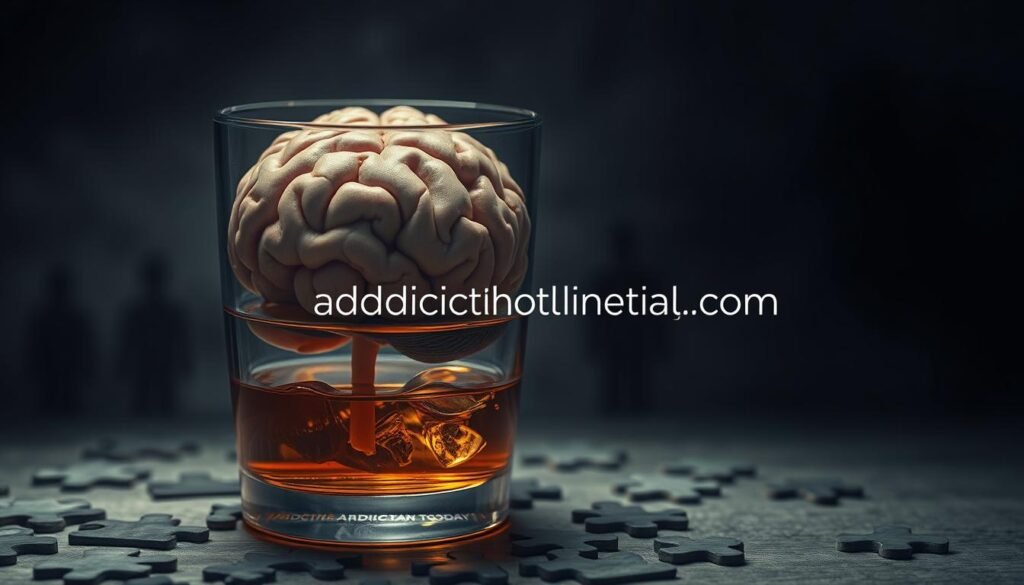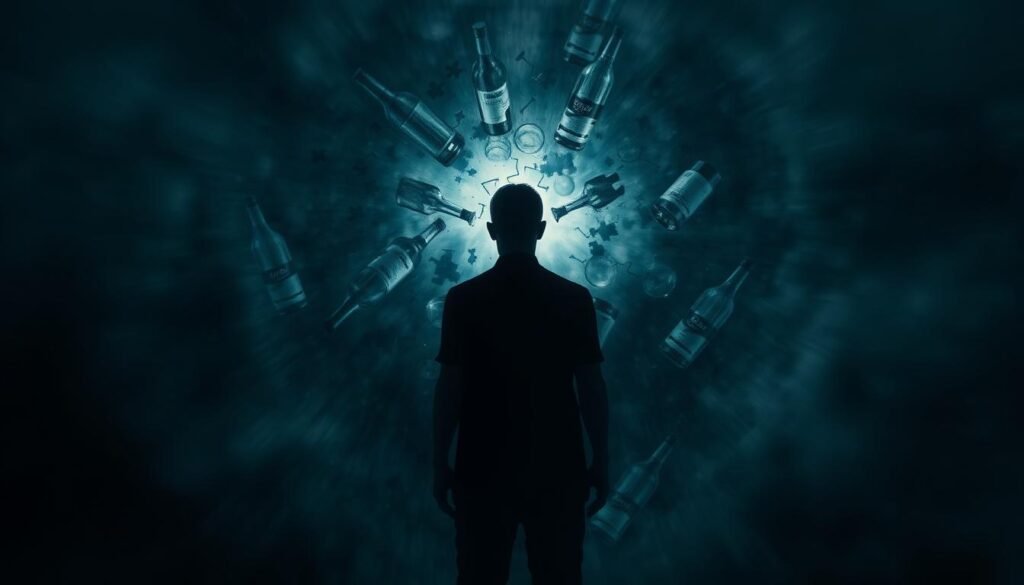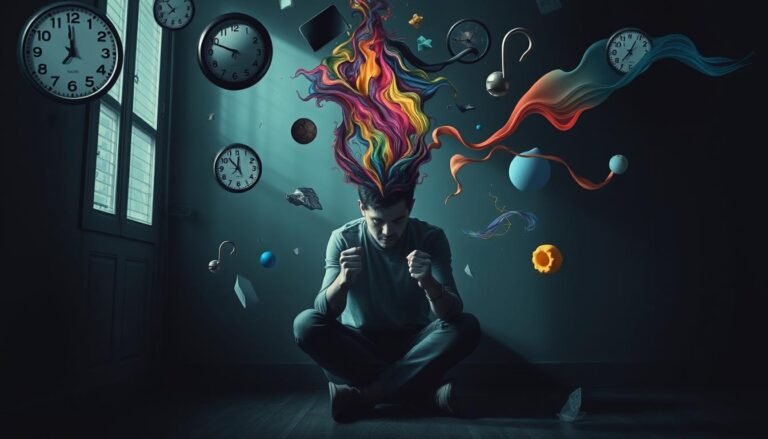The Hidden Toll of Alcoholism on Your Mental Health
What happens when the substance you turn to for relief becomes the source of your suffering? This is a reality for many individuals struggling with alcoholism. It can have a profound impact on mental health. Excessive alcohol consumption damages the brain’s ability to manage anxiety, fear, and stress.
As a result, individuals may experience increased feelings of worry, panic, and being overwhelmed. This is the impact of alcoholism on mental health.
The effects of alcoholism on mental health can be devastating. Chronic, untreated alcohol addiction can lead to more severe and sometimes permanent mental health effects. Up to half of individuals struggling with a mental illness also experience symptoms related to a substance use disorder.
This presents a high prevalence of co-occurring disorders. The impact of alcoholism on mental health is a complex issue. Understanding the hidden dangers is key for seeking help and recovery.
For the latest information on addiction and recovery, readers can log onto addictionhotlinetoday.com, habitrecovery.com, and rehabme.org.
Key Takeaways
- Alcoholism can have a profound impact on mental health, leading to increased susceptibility to anxiety, depression, and other mental health disorders.
- The hidden dangers of alcoholism on mental health include excessive alcohol consumption damaging the brain’s ability to manage anxiety, fear, and stress.
- Chronic, untreated alcohol addiction can lead to more severe and sometimes permanent mental health effects.
- Up to half of individuals struggling with a mental illness also experience symptoms related to a substance use disorder.
- Understanding the impact of alcoholism on mental health is key for seeking help and recovery.
- Seeking professional help from therapists, counselors, or support groups is essential for quitting alcohol addiction and addressing the impact of alcoholism on mental health.
- Treatment for alcohol use disorder may include detoxification, behavioral therapy, medications, support groups, inpatient rehabilitation, and outpatient programs to address the hidden dangers of alcoholism on mental health.
Understanding the Complex Relationship Between Alcohol and Mental Health
Alcoholism affects both body and mind. It changes how our brain works and looks.
The Brain-Alcohol Connection
Drinking alcohol often changes parts of the brain. These changes can hurt how we make decisions, remember things, and act.
How Alcohol Affects Neurotransmitters
Alcohol messes with the brain’s chemicals. This can cause mood swings, anxiety, and make us more likely to have mental health problems.
The Cycle of Dependency and Mental Health
Being dependent on alcohol can make mental health issues worse. People might drink to feel better, but it actually makes things worse. This makes it harder to get better.
- Alcoholism contributes to approximately 3 million deaths globally each year.
- People with alcohol use disorder are more likely to have mental health issues.
- More people are becoming addicted to alcohol, with about 14% of the world’s population struggling.
Hidden Dangers: The Impact of Alcoholism on Mental Health
Alcoholism quietly harms the brain, causing big mental health problems. It’s key to know how alcohol addiction affects mental health.
- Blackouts: Losing memory during heavy drinking.
- Memory Problems: Trouble remembering recent things.
- Poor Judgment: Making unsafe choices.
- Mood Changes: Feeling happy then sad.
Long-term use makes these problems worse. It can lead to lasting alcoholism and mental health disorders like depression and anxiety. Things like job loss can make it worse.
| Effect | Short-Term | Long-Term |
|---|---|---|
| Memory | Blackouts | Chronic memory loss |
| Judgment | Poor decision-making | Increased risk-taking behaviors |
| Mood | Rapid mood swings | Persistent depression |
| Health Risks | Alcohol poisoning | Heart disease and liver damage |
Seeing these dangers is the first step to getting help. Getting professional help is key to beating alcohol addiction’s mental health effects and starting recovery.
Early Warning Signs of Alcohol-Related Mental Health Issues
It’s important to spot early signs of alcohol problems. This helps get help fast. Knowing these signs can help someone get help before things get worse.
Behavioral Changes to Watch For
- Drinking alone or hiding drinking habits (20-30%)
- Increased risk-taking behaviors (15-20%)
- Frequent conflicts with loved ones (30-40%)
- Decline in work or academic performance (25-35%)
- Neglecting household duties (20-25%)
Emotional Red Flags
- Persistent feelings of sadness or lethargy (25-35%)
- Excessive worry or panic attacks (25-35%)
- Guilt or shame about drinking (25-35%)
- Defensiveness or denial about alcohol use (30-40%)
Physical Symptoms That Affect Mental State
- Shaky hands or tremors, even when not drinking
- Severe hangovers with nausea and headaches
- Weight loss or gain from bad eating habits
- Impaired coordination leading to accidents
- Weakened immune system making you sick more often
| Early Warning Sign | Prevalence (%) |
|---|---|
| Drinking alone or hiding habits | 20-30% |
| Increased risk-taking behaviors | 15-20% |
| Frequent conflicts with loved ones | 30-40% |
| Decline in work or academic performance | 25-35% |
| Neglecting household duties | 20-25% |
| Persistent feelings of sadness or lethargy | 25-35% |
| Excessive worry or panic attacks | 25-35% |
| Shaky hands or tremors | N/A |
| Severe hangovers | N/A |
| Impaired coordination | N/A |
Depression and Alcoholism: A Two-Way Street
It’s key to know how alcoholism affects mental wellbeing. Drinking too much alcohol messes with our brain chemicals. This can make us feel sad and angry.
Alcoholism and depression are closely linked. People might drink to feel better, but it makes things worse. This creates a bad cycle.
- Nearly 29.5 million Americans are affected by Alcohol Use Disorder (AUD) annually.
- Individuals with AUD are 10 times more likely to consider or attempt suicide than the general population.
- Alcoholism contributes to 35% of homelessness cases in the U.S.
To tackle alcoholism and mental health risks, we need to treat both together. Cognitive Behavioral Therapy (CBT) and support groups help. They teach ways to deal with depression and alcohol use.
| Statistic | Details |
|---|---|
| Prevalence of AUD | 29.5 million Americans annually |
| Suicide Risk | Individuals with AUD are 10 times more likely to attempt suicide |
| Homelessness Contribution | 35% of homelessness cases in the U.S. |
Anxiety Disorders and Their Relationship with Alcohol Use
It’s important to understand how anxiety and alcohol use are linked. Many people drink to feel better when they’re anxious. But this can make their mental health problems worse.
Social Anxiety and Self-Medication
Those with social anxiety might drink to feel more at ease in groups. This can lead to needing more alcohol and becoming dependent. It makes their mental health issues worse.
Panic Disorders and Alcohol Dependence
People with panic disorders might drink more to try to stop their panic attacks. About 50% of those with severe mental health issues also have substance abuse problems.
Breaking the Anxiety-Alcohol Cycle
To break the cycle of anxiety and drinking, you can:
- Get help from a mental health professional
- Try cognitive-behavioral therapy
- Build a strong support network
- Find healthy ways to cope
| Statistic | Data |
|---|---|
| Individuals with severe mental disorders affected by substance abuse | 50% |
| People diagnosed as mentally ill who abuse alcohol or drugs | 29% |
| Alcohol abuse prevalence among drug abusers | 53% |
The Impact of Chronic Drinking on Cognitive Function
Chronic drinking has hidden dangers the impact of alcoholism on mental health. It makes it hard to deal with tough life situations. Many turn to alcohol instead of facing problems, which stops them from learning how to cope well.
Long-term alcohol use harms many parts of your brain. This includes:
- Decision-Making: Bad choices and risky actions happen because of poor judgment.
- Problem-Solving: It’s hard to find solutions to daily problems.
- Memory: Drinking a lot can cause memory loss and more blackouts.
The mental health impact of alcohol addiction also includes alcoholic dementia. This is a serious brain problem caused by drinking too much alcohol over time. It leads to memory loss, making up stories, and trouble with thinking and planning.
Risk factors for these brain problems include:
- Drinking a lot for a long time
- Not getting enough nutrients, like malnutrition
- Having liver disease
It’s important to catch these problems early. Doctors can help with treatments like thiamine and support. Sticking to alcohol limits—no more than two drinks a day for men and one for women—can help avoid brain problems.

Studies say heavy drinking can be changed to lower dementia risk. Watching how much and when you drink is key to avoiding brain damage from alcohol.
Alcohol-Induced Psychosis and Mental Health Disorders
Drinking too much alcohol can cause serious mental health problems. This includes alcohol-induced psychosis. It changes how people see things and live their lives. It’s important to know how alcoholism and mental health are connected to treat it well.
Types of Alcohol-Related Psychotic Episodes
There are different kinds of psychotic episodes linked to alcohol:
- Delirium Tremens: Severe withdrawal that can cause hallucinations and agitation.
- Alcoholic Hallucinosis: Hearing voices during or after drinking a lot.
- Wernicke-Korsakoff Syndrome: Brain damage from not getting enough vitamin B1, leading to hallucinations.
Treatment Approaches for Dual Diagnosis
Dealing with both alcoholism and mental health issues needs a full plan:
- Dual Diagnosis Programs: Treat both problems at the same time.
- Medical Supervision: Very important during detox to keep symptoms under control.
- Therapeutic Support: Counseling and therapy to fix deep psychological problems.
| Psychotic Episode | Symptoms | Treatment Approach |
|---|---|---|
| Delirium Tremens | Severe agitation, hallucinations, confusion | Medical detox, close monitoring |
| Alcoholic Hallucinosis | Hearing voices, seeing things | Dual diagnosis rehab, therapy |
| Wernicke-Korsakoff Syndrome | Memory loss, hallucinations | Vitamin supplementation, long-term care |
Memory Loss and Brain Structure Changes
Drinking alcohol harms the brain’s function. It affects memory and thinking skills, not just mood.
Short-Term Memory Impairment
Drinking, even a little, makes it hard to remember things. People might forget parts of their day or have gaps in their memory. This can mess up daily life and relationships.
Long-Term Cognitive Decline
Drinking a lot over time damages brain parts for memory and making choices. It can shrink the brain and mess up how brain cells talk to each other. This damage might not go away even if you stop drinking.
| Statistic | Details |
|---|---|
| Prevalence of Regular Alcohol Consumption | Approximately 63% of Americans consume alcohol regularly. |
| Cognitive Impairment in Alcohol Use Disorder | 50-70% of individuals with alcohol use disorder develop some form of cognitive impairment. |
| Risk of Major Depressive Disorders | People with alcohol dependence are 3.7 times more likely to have major depressive disorders. |
| Suicide-Related Deaths in 2021 | 48,183 suicide-related deaths were recorded in the United States, equating to one every 11 minutes. |
Social and Emotional Intelligence Deterioration

Alcoholism hurts how we connect with others. It affects our mental health a lot. This includes how we interact and understand feelings.
People with alcohol addiction find it hard to keep good relationships. They might face:
- Increased divorce rates
- Higher instances of domestic violence
- Struggles with unemployment
- Rising poverty levels
Alcohol addiction also makes it hard to feel empathy and control emotions. This leads to feeling alone and causing more problems.
This problem affects families and communities a lot. Families suffer, communities see more violence, and jobs are lost because of alcohol.
Recovery and Mental Health Restoration
Starting your recovery journey is key to beating alcoholism and mental health risks. It’s important to tackle both addiction and the mental issues behind it.
Professional Treatment Options
Professional help offers clear paths to getting better. You can choose from:
- Medication-Assisted Treatment: Uses medicines and counseling to cut cravings.
- 12-Step Programs: Offers support from others and a plan for staying sober.
- Residential Treatment Facilities: Gives deep care in a safe place.
Therapy and Counseling Approaches
Therapy digs deep into why you might drink too much. Good methods include:
- Cognitive Behavioral Therapy (CBT): Changes bad thinking patterns.
- Dialectical Behavior Therapy (DBT): Teaches managing feelings and getting along with others.
- Motivational Interviewing: Helps find reasons to change by looking at doubts.
Support Group Benefits
Being in support groups helps a lot. They offer:
- Peer Support: Meeting others with the same issues.
- Accountability: Keeping up with goals with help from others.
- Shared Experiences: Learning from others’ wins and losses.
Recovery is a long journey that needs commitment, support, and new ways to handle problems. With the right treatment, therapy, and support groups, you can face the hidden dangers and the impact of alcoholism on mental health. This leads to a better, happier life.
Building a Mental Health-Focused Recovery Plan
Creating a recovery plan that focuses on mental health is key to beating alcohol dependence. Knowing how alcoholism and mental health are linked helps tackle both at once. This boosts the chance of lasting success.
Creating Healthy Coping Mechanisms
It’s important to find new, healthy ways to cope. Replacing alcohol with good habits can really help your mental health.
- Exercise regularly to boost mood and reduce stress.
- Practice mindfulness and meditation to enhance self-awareness.
- Engage in journaling to track emotions and triggers.
Developing Support Networks
Having a strong support system is key to staying sober and healthy mentally. Support networks offer encouragement and help keep you on track.
- Join support groups like Alcoholics Anonymous to connect with others.
- Lean on family and friends for emotional support.
- Seek professional counseling to address underlying issues.
About 15 million people in the US face alcohol use disorder. Treatment plans that tackle both addiction and mental health work better. This shows why treating both together is so important.
Conclusion: Embracing Mental Wellness Through Recovery
Alcoholism deeply affects our mental health. It’s important to know how alcohol and mental health are linked. Recovery helps us get our mental health back and take control of our lives.
Getting help can really improve how we feel and think. Groups like Alcoholics Anonymous offer support. They help people do well and feel better.
It’s key to stay informed. For the latest on addiction and mental health, check out addictionhotlinetoday.com, habitrecovery.com, and rehabme.org. These sites have great advice and support for beating alcoholism and improving mental health.






